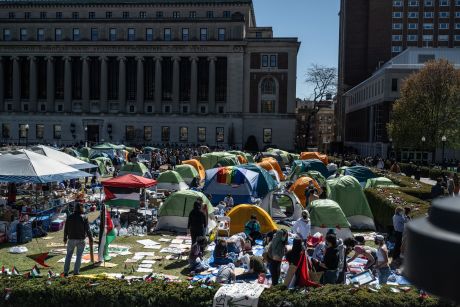The following is cobbled together from the quoted text in the reporting at The Intercept on a leaked memo that the New York Times sent to its writers on how to report on the genocide in Gaza, on how to erase a historical atrocity in real time:
“The nature of the conflict has led to inflammatory language and incendiary accusations on all sides. We should be very cautious about using such language, even in quotations. Our goal is to provide clear, accurate information, and heated language can often obscure rather than clarify the fact.”
carnage – “Words like ‘slaughter,’ ‘massacre’ and ‘carnage’ often convey more emotion than information. Think hard before using them in our own voice. Can we articulate why we are applying those words to one particular situation and not another? As always, we should focus on clarity and precision — describe what happened rather than using a label.”
ethnic cleansing – “If someone is making such an accusation, we should press for specifics or supply proper context.”
fighters – “Avoid ‘fighters’ when referring to the Oct. 7 attack; the term suggests a conventional war rather than a deliberate attack on civilians. And be cautious in using ‘militants,’ which is interpreted in different ways and may be confusing to readers.” See “terrorist” below.
genocide – “‘Genocide’ has a specific definition in international law. In our own voice, we should generally use it only in the context of those legal parameters. We should also set a high bar for allowing others to use it as an accusation, whether in quotations or not, unless they are making a substantive argument based on the legal definition.”
massacre – see carnage.
militants – see fighters
occupied territories – “When possible, avoid the term and be specific (e.g. Gaza, the West Bank, etc.) as each has a slightly different status.”
Palestine – “Do not use in datelines, routine text or headlines, except in very rare cases such as when the United Nations General Assembly elevated Palestine to a nonmember observer state, or references to historic Palestine.”
refugee camps – “While termed refugee camps, the refugee centers in Gaza are developed and densely populated neighborhoods dating to the 1948 war. Refer to them as neighborhoods, or areas, and if further context is necessary, explain how they have historically been called refugee camps.”
terrorist – “It is accurate to use ‘terrorism’ and ‘terrorist’ in describing the attacks of Oct. 7, which included the deliberate targeting of civilians in killings and kidnappings. We should not shy away from that description of the events or the attackers, particularly when we provide context and explanation.”
“We do not need to assign a single label or to refer to the Oct. 7 assault as a ‘terrorist attack’ in every reference; the word is best used when specifically describing attacks on civilians. We should exercise restraint and can vary the language with other accurate terms and descriptions: an attack, an assault, an incursion, the deadliest attack on Israel in decades, etc. Similarly, in addition to ‘terrorists,’ we can vary the terms used to describe the Hamas members who carried out the assault: attackers, assailants, gunmen.”
slaughter – see carnage.
– Abagond, 2024.
Source: The Intercept (April 15th 2024).
See also:
- The New York Times
- The 2023 Israel-Hamas war
- propagandistic language:
- my own posts on some of these terms:
- Notes towards a media guide to Gaza – from 2012 but still roughly right
560




















